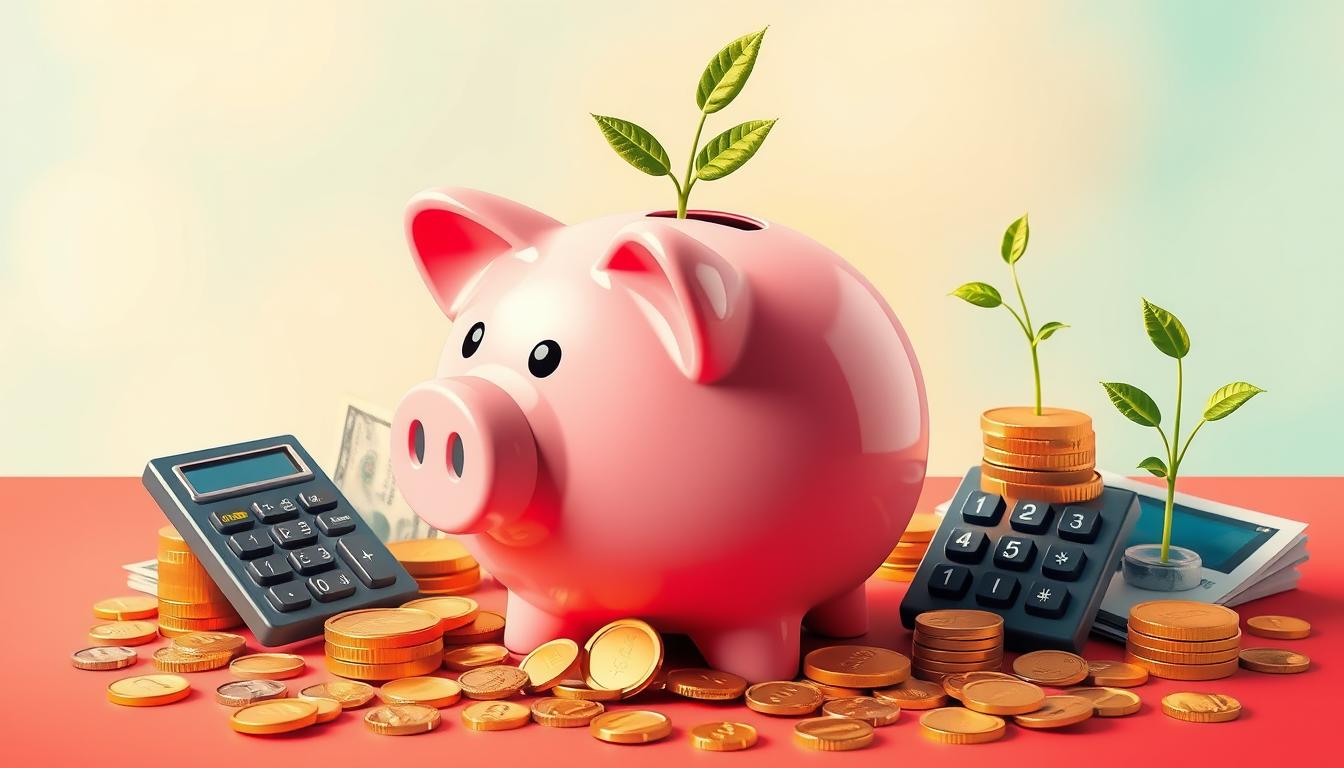Are you tired of living paycheck to paycheck? Constantly worrying about your financial stability? You’re not alone. Many Americans struggle to save and plan for their future. But, with the right strategies and discipline, you can take control of your finances.
In this article, we’ll cover smart money-saving tips and personal finance basics. These will help you reach your financial goals, like paying off debt or saving for retirement. Get ready to discover the secrets to financial freedom and start your journey towards a more prosperous tomorrow.
 Working towards financial stability and growth starts with frugal living and saving money hacks. Simple changes in your daily life can cut expenses without lowering your quality of life. This section covers key money-saving tips, from energy-saving to grocery shopping, to help you build a better financial future.
Working towards financial stability and growth starts with frugal living and saving money hacks. Simple changes in your daily life can cut expenses without lowering your quality of life. This section covers key money-saving tips, from energy-saving to grocery shopping, to help you build a better financial future.
By using these money-saving tips, you can start building a better financial future. Remember, small changes can add up to big savings over time. This helps you reach your financial goals more easily.
 Learning about personal finance is key to a secure financial future. Two top budgeting methods are the cash envelope system and digital tools. These strategies help you control spending and achieve long-term financial stability.
Learning about personal finance is key to a secure financial future. Two top budgeting methods are the cash envelope system and digital tools. These strategies help you control spending and achieve long-term financial stability.
Key Takeaways
- Understand the basics of personal finance to create a strong financial foundation.
- Set clear financial goals and develop a plan to achieve them.
- Implement practical money-saving tips for daily life to boost your savings.
- Explore advanced saving methods, such as high-yield savings accounts and investment strategies.
- Develop a disciplined budgeting approach to ensure long-term financial success.
Understanding the Fundamentals of Personal Finance
Building a solid financial foundation is key to reaching your long-term goals. Learning the basics of personal finance helps you develop smart money habits. These habits will benefit you for the rest of your life.Building a Strong Financial Foundation
The first step is to understand your current financial situation. This means tracking your income, expenses, and net worth. Knowing where your money goes helps you find ways to save more.Setting Clear Financial Goals
After understanding your finances, set SMART financial goals. These goals can be anything from paying off debt to saving for a house. Having clear goals helps you stay focused and motivated.Creating a Financial Safety Net
Creating a financial safety net is vital. This means saving enough for at least three to six months of essential expenses. Having this safety net helps you avoid debt when unexpected expenses arise. Mastering personal finance lets you take control of your money. With the right budgeting advice, smart money habits, and money management techniques, you can reach your financial goals. This brings you peace of mind and a secure financial future.“Financial freedom is available to those who learn about it and work for it.” – Robert Kiyosaki
Essential Money Saving Tips for Daily Life
 Working towards financial stability and growth starts with frugal living and saving money hacks. Simple changes in your daily life can cut expenses without lowering your quality of life. This section covers key money-saving tips, from energy-saving to grocery shopping, to help you build a better financial future.
Working towards financial stability and growth starts with frugal living and saving money hacks. Simple changes in your daily life can cut expenses without lowering your quality of life. This section covers key money-saving tips, from energy-saving to grocery shopping, to help you build a better financial future.
Maximize Energy Savings
Energy-efficient habits can save a lot of money. Begin by checking your home for ways to use less energy. Switch to LED bulbs, turn off unused electronics, and adjust your thermostat to save on bills.Smart Grocery Shopping Strategies
Grocery bills can grow fast, but smart shopping can help. Plan meals, make a shopping list, and stick to it to avoid buying things you don’t need. Use coupons, join loyalty programs, and buy seasonal produce to save more.Reduce Transportation Costs
Transportation costs can eat into your budget. Try carpooling, public transport, or biking instead. Keep your car in good shape and drive efficiently to save money over time.| Frugal Living Strategies | Estimated Monthly Savings |
|---|---|
| Energy-efficient home upgrades | $50 – $150 |
| Meal planning and grocery shopping tips | $100 – $300 |
| Alternative transportation options | $75 – $200 |
Smart Budgeting Strategies for Long-term Success
 Learning about personal finance is key to a secure financial future. Two top budgeting methods are the cash envelope system and digital tools. These strategies help you control spending and achieve long-term financial stability.
Learning about personal finance is key to a secure financial future. Two top budgeting methods are the cash envelope system and digital tools. These strategies help you control spending and achieve long-term financial stability.
Implementing the Cash Envelope System
The cash envelope system is a proven way to manage spending. It involves dividing your budget into categories like groceries and entertainment. Each category gets a set amount of cash. When that cash runs out, you know it’s time to stop spending in that area until next month. This method promotes mindful spending and avoids overspending with credit or debit cards. Seeing and handling cash makes you more aware of your spending. It helps you stay on budget.Using Digital Budgeting Tools
If you like technology, there are many budgeting apps that can help. These apps track expenses, update budgets, and link to bank accounts. They give a full view of your finances.
Apps like YNAB and Mint make budgeting easy. They let you categorize spending, set goals, and track progress. They’re great for those who find manual budgeting hard or prefer managing finances on the go.Tracking Expenses Effectively
Tracking expenses is essential for financial success, no matter the method. Recording and categorizing spending helps you understand your habits. It shows where to improve and guides financial decisions. Tracking expenses, with tools or spreadsheets, helps you make better spending choices. It builds a strong financial base for the future. Adopting these smart budgeting strategies can improve your finances. Whether you like the cash envelope system or digital tools, the goal is to match your method to your financial goals.Advanced Saving Methods for Financial Independence
Working towards a secure financial future? Advanced saving strategies can make a big difference. This section will show you how to reach financial independence and retire early. You’ll learn about high-yield savings accounts and strategic investments.High-Yield Savings Accounts
High-yield savings accounts are a great way to grow your savings. They offer higher interest rates than regular savings accounts. This means your money can grow faster. By putting a part of your income into a high-yield account, you build a strong base for your financial goals. It’s a smart way to save for the future.Investment Strategies for Beginners
Investing can seem scary at first, but it’s key to building wealth. Start with safe options like index funds or ETFs. They offer diversification and steady growth over time. As you get more comfortable, you can try more complex strategies. Always remember to consider your risk level and how long you can invest.Planning for Early Retirement
The FIRE movement is all about retiring early. It focuses on saving and investing a lot of your income. The goal is to be financially independent and retire before you’re 65. To retire early, focus on reducing debt and saving aggressively. A disciplined savings plan can help you achieve financial freedom sooner. This way, you can enjoy a secure and fulfilling retirement.FAQ
What are the key personal finance fundamentals I should understand?
Understanding your income, expenses, and net worth is key. Start by budgeting and setting financial goals. Also, make sure to have an emergency fund.
How can I save money on my daily expenses?
Save money by living frugally. Use less energy, shop smart for groceries, and choose cheaper ways to travel.
What are some effective budgeting techniques I can use?
Good budgeting techniques include the cash envelope system and digital tools. Tracking your spending is also helpful. These methods help you manage your money better.
What are some advanced saving methods for achieving financial independence?
For financial independence, try high-yield savings accounts and beginner investments. Early retirement planning through FIRE is also key. Reducing debt helps build wealth faster.
How can I develop good money management habits?
Good habits start with a budget and expense tracking. Set financial goals and save daily. An emergency fund and debt reduction are also important.
What are some of the best budgeting apps available?
Top budgeting apps are Mint, YNAB, PocketGuard, and Goodbudget. They help track spending and create budgets, improving your financial view.
How can I make the most of the cash envelope system?
The cash envelope system divides cash into spending categories. It helps stick to your budget by seeing your cash limits.
What is the 100-envelope challenge, and how can it help me save money?
The 100-envelope challenge saves money by using envelopes with different amounts. It builds savings through daily, small contributions.
How can I reduce my energy costs and save money on utilities?
Save on utilities by using energy-efficient appliances and adjusting your thermostat. Being mindful of energy use also helps.
What are some effective strategies for saving money on groceries?
Save on groceries with meal planning, coupons, and bulk buying. Store loyalty programs and generic items also help. Avoid impulse buys.
I hope you were able to find some value in the article.




